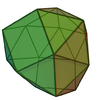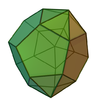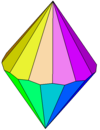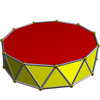 Triakis octahedron |
 Tetrakis hexahedron |
 Deltoidal icositetrahedron |
 Pentagonal icositetrahedron |
In geometry, an icositetrahedron[1] refers to a polyhedron with 24 faces, none of which are regular polyhedra. However, many are composed of regular polygons, such as the triaugmented dodecahedron and the disphenocingulum. Some icositetrahedra are near-spherical, but are not composed of regular polygons. A minimum of 14 vertices is required to form a icositetahedron.[2]
Symmetry
There are many symmetric forms, and the ones with highest symmetry have chiral icosahedral symmetry:
Four Catalan solids, convex:
- Triakis octahedron - isosceles triangles
- Tetrakis hexahedron - isosceles triangles
- Deltoidal icositetrahedron - kites
- Pentagonal icositetrahedron - pentagons
27 uniform star-polyhedral duals: (self-intersecting)
- Small rhombihexacron, Great rhombihexacron
- Small hexacronic icositetrahedron, Great hexacronic icositetrahedron
- Great deltoidal icositetrahedron
- Great triakis octahedron
Examples with lower symmetry include certain dual polyhedra of Johnson solids , such as the gyroelongated square bicupola and the elongated square gyrobicupola.
Common examples
Common examples include prisms and pyramids, and include certain Johnson solids and Catalan solids.
Icositrigonal pyramids
Icositrigonal pyramids are a type of cone with an icositrigon as a base, with 24 faces, 46 edges, and 24 vertices.[3] Regular icositrigonal pyramids have a regular icositrigon as a base, and its Schläfli symbol is {}∨{23}. The surface area and volume with side length and height can be calculated as follows:[3]
Icosidigonal prism
Icosidigonal prisms are a type of cylinder with an icosidigon as a base, with 24 faces, 66 edges, and 44 vertices.[4] Regular icosidigonal prisms have a regular icosidigon as a base, with each face a rectangle. Every vertex borders 2 squares and an icosidigon base. Its vertex configuration is , its Schläfli symbol is {22}×{} or t{2,22}, its Coxeter diagram is ![]()
![]()
![]()
![]()
![]()
![]() , and its Conway polyhedron notation is P22. The surface area and volume with side length and height can be calculated as follows:
, and its Conway polyhedron notation is P22. The surface area and volume with side length and height can be calculated as follows:
Hendecagonal antiprism

Hendecagonal antiprisms are antiprisms with a hendecagon as a base, with 24 faces, 44 edges, and 22 vertices. Regular hendecagonal antiprisms have a regular hendecagon as a base, with each face an equilateral triangle. Every vertex borders 2 triangles and a hendecagon base. Its vertex configuration is .
Dodecagonal trapezohedron
Dodecagonal trapezohedra are the tenth member of the trapezohedra family, made of 24 congruent kites arranged radially. Every dodecagonal trapezohedron has 24 faces, 28 edges, and 26 vertices. There are two types of vertices, ones bordering 12 kits and ones bordering 3. Its dual polyhedron is the Hendecagonal antiprism.[5] Its Schläfli symbol is { }⨁{12}, its Coxeter diagram is ![]()
![]()
![]()
![]()
![]()
![]() or
or ![]()
![]()
![]()
![]()
![]() , and its Conway polyhedron notation is dA12.
, and its Conway polyhedron notation is dA12.
Dodecagonal trapezohedra are isohedral figures.
Johnson solids
There are two examples of Johnson solids which are icositetrahedra. They are listed as follows:
| Name | Image | Designation | Vertices | Edges | Faces | Types of faces | Symmetry group | Net |
|---|---|---|---|---|---|---|---|---|
| Disphenocingulum | 
|
J90 | 16 | 38 | 24 | 20 equilateral triangle,
4 squares |
D2d | 
|
| Triaugmented dodecahedron | 
|
J61 | 23 | 45 | 24 | 15 equilateral triangles,
9 pentagons |
C3v | 
|
Catalan Solids
There are 5 types of icositetrahedra with different topologies.[6] The pentagonal icositetetrahedron has two mirror images (enantiomorphs), so geometrically there are 4 distinct Catalan icositetetrahedra.
| Name | Image | Net | Dual | Faces | Edges | Vertices | Face Configuration | Point Group |
|---|---|---|---|---|---|---|---|---|
| Triakis octahedron | 
|

|
Truncated cube | 24 | 36 | 14 | Isosceles triangle
V3.8.8 |
Oh |
| Tetrakis hexahedron | 
|

|
Truncated octahedron | 24 | 36 | 14 | Isosceles triangle
V4.6.6 |
Oh |
| Deltoidal icositetrahedron | 
|

|
Rhombicuboctahedron | 24 | 48 | 26 | Kite
V3.4.4.4 |
Oh |
| Pentagonal icositetrahedron | 
|

|
Snub cube | 24 | 60 | 38 | irregular pentagon
V3.3.3.3.4 |
O |
Uniform star polyhedra
Some uniform star polyhedra also have 24 faces:
| Name | Image | Wythoff symbol | Vertex figure | Symmetry group | Faces | Edges | Vertices | Euler characteristic | Density | Faces by sides |
|---|---|---|---|---|---|---|---|---|---|---|
| Ditrigonal dodecadodecahedron | 
|
3 | 5/3 5 | (5.5/3)3 |
Ih | 24 | 60 | 20 | -16 | 4 | 12{5}+12{5/2} |
| Dodecadodecahedron | 
|
5 5/2 | 
5.5/2.5.5/2 |
Ih | 24 | 60 | 20 | -16 | 4 | 12{5}+12{5/2} |
| Truncated great dodecahedron | 
|
2 5/2 | 5 | 
10.10.5/2 |
Ih | 24 | 90 | 60 | -6 | 3 | 12{5/2}+12{10} |
| Small stellated truncated dodecahedron | 
|
2 5 | 5/3 | 
10/3.10/3.5 |
Ih | 24 | 90 | 60 | -6 | 9 | 12{5}+12{10/3} |
Types of icositetrahedra
| Name | Type | Image | Identifier | Faces | Edges | Vertices | Euler characteristic | Types of faces | Symmetry | Net |
|---|---|---|---|---|---|---|---|---|---|---|
| Icosidigonal prism | Prism | t{2,22}
{22}x{}
|
24 | 66 | 44 | 2 | 2 icosidigons,
22 squares |
D22h, [22,2], (*22 2 2), order 88 | ||
| Icositrigonal pyramid | Pyramid | ( )∨{23} | 24 | 46 | 24 | 2 | 1 icositrigon,
23 triangles |
C23v, [23], (*23 23) | ||
| Icosidigonal frustum | Frustum | 24 | 66 | 44 | 2 | 2 icosidigons,
22 trapezoids |
D22h, [22,2], (*22 2 2), order 88 | |||
| Dodecagonal bipyramid | Bipyramid | { } + {12}
|
24 | 36 | 14 | 2 | 12 triangles | D12h, [12,2], (*2 2 12), order 48 | ||
| Dodecagonal trapezohedron | Trapezohedron | 
|
{ }⨁{12}[7] | 24 | 48 | 26 | 2 | 24 kites | D12d, [2+,12], (2*12) | |
| Hendecagonal antiprism | Antiprism | 
|
s{2,22}
sr{2,11}
|
24 | 44 | 22 | 2 | 2 hendecagons,
22 triangles |
D11d, [2+,22], (2*11), order 44 | |
| Hendecagonal cupola | Cupola | 24 | 55 | 33 | 2 | 11 equilateral triangles,
11 squares, 1 regular hendecagon, 1 regular icosidigon |
D11d, [2+,22], (2*11), order 44 | |||
| Deltoidal icositetrahedron | Johnson solid | 
|
24 | 48 | 26 | 2 | 24 kites | D4d | 
|
See Also
References
- ^ "Greek numerical prefixes". www.georgehart.com. Retrieved 2025-02-02.
- ^ "Enumeration of Polyhedra - Numericana". www.numericana.com. Retrieved 2025-02-02.
- ^ a b "Icositrigonal pyramid - Wolfram|Alpha". www.wolframalpha.com. Archived from the original on 2024-11-30. Retrieved 2025-02-02.
- ^ "Icosidigonal prism". Wolfram Alpha. Retrieved 2025-02-02.
- ^ "12-trapezohedron". Wolfram Alpha. Retrieved 2025-02-02.
- ^ "Sur la théorie des quantités positives et négatives", Cours d'analyse de l'École Royale Polytechnique, Cambridge University Press, pp. 403–437, 2009-07-20, retrieved 2025-02-02
- ^ Johnson, N.W. (2018). "Chapter 11: Finite symmetry groups". Geometries and Transformations. p. 235. ISBN 978-1-107-10340-5.




















You must be logged in to post a comment.